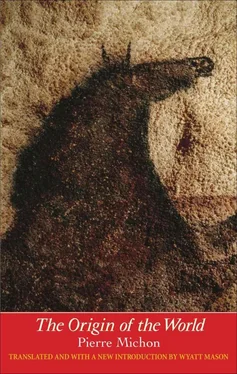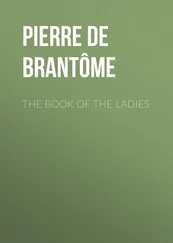What slept beneath the dust in a glass display case in the rear of the class came from a deeper beyond. The case was from the last century, from the era of socialist savants, of the three Jules, of yet another Republic, from a time when athletic curates of the Périgord would roll up their cassocks and crawl through caves in search of Adam’s remains, a time when instructors, from Périgord as well, were themselves crawling around in the mud with a couple of brats in tow, making their way to remains that would prove once and for all that man wasn’t born of Adam; such was the provenance of the case’s contents, as the labels affixed to each object attested, learned names calligraphied in a fine hand typical of the time, a beautiful hand, vain, rounded, cluttered, ardent, a hand they all shared, the fools, each group more modest than the next, those who believed in Scripture and those who believed in mankind’s glorious tomorrows; but the case held artifacts from our century as well, however stingy by comparison; how the calligraphy had suffered at Verdun, how the calligraphy had fallen to ashes, to spidery scrawls, in the hells of Poland and Slovakia, in infamous camps not far from Attila’s own but which made Attila’s look like schools of philosophy, fields of beets and watch-towers that neither God nor man would have use of again; and despite Verdun and the Slovakian fog, the teachers, without this fine hand, had continued all the same, heroically in a sense, to put long names on little stones, with the faith that remained theirs, that of habit, which was better than nothing; and beyond just arriving from teachers of every stripe, the contents were gathered by other men as well, men who had made things, not just labels, men of whom we can no longer say whether they believed in something while making them or whether they believed in nothing and made them out of habit, but whom we rightly believe never demeaned themselves as deeply as those in the Slovakian Circles. These were just stones. What one calls weapons; harpoons, battle-axes, blades, though they seemed like stones that the ground spits up after rainstorms, which they were as well; these were flints, the fabulous silicates that had received the names of long-forgotten villages and which in return had saddled these villages with the weight of history, had burrowed underneath an infinity of catacombs, older than Mycenae, older than Memphis, than Genesis with all its dead, and so convincingly that we ask ourselves to whom the Mayor of Les Eyzies was addressing himself on the eleventh of November, with his little piece of paper wavering in the north wind, standing before a monument to the dead; these crude flints, precious in their own way like the gold coffins in the Valley of the Kings; more precious; the noble flints with royal patronyms drawn from their parishes in Somme, in Lot, in Yonne, and which too carry first names of fishes and trees, of birds— Willow Leaf of Solutré, Parrot’s Beak of Madeleine, Great Dab of Saint-Acheul —but which quickly acquired sobriquets— the loveliest, the oldest, the most perverse —each a shimmering jewel, and each of which nonetheless could kill a cow, impeccably. The display case sat there: we were right around the corner from Lascaux, the Beune flows into the old Vézère valley, the ground brims with these implements of slaughter, these obsolete grenades forever with pins pulled and bouncing through brooks, freezing in the ice, rising through the roots of fallen trees and leaping from ditches upturned by the plow, children collecting them on a road and carrying them to school under their bonnets, in their little Wallachian hats, and with a sweet smile offering them to a teacher well versed in such things, interested in them, held in their weak little hands, these bits of darkness. That accomplished, they sit, slip off their schoolbags, and unwind by shuffling their feet, tipping their braids and necks over pages where little rabbits show them how to read; and to make their parents happy, their teacher, and even they themselves occasionally, they try to grow up unfazed by what looms behind them, in a display case filled with stickers. These stones rolled all the way to the Castelnau school and were waiting for the flood that would roll them elsewhere, remaining stickered this time so that they might be read by fish. There was another quarter hour to kill before the end of recess; through the window there was still this rain, this fog filled with people that Hélène called Jean the Fisherman; two little bundles below were attempting an outing in the courtyard, moving at a gallop, running with shivery, excited cries back to the playground; I left the stones there, their low weights; I was sitting on my desk; I was listening to their legs. I was giving myself over to another devotion, to another brand of violence. I was thinking about the tobacconist.
The Tabac was beneath the old arcade, on the fairground that is Castelnau’s square, home to its businesses. I went in shortly after my arrival, after school, of an evening. And of course it was raining, my hair was soaking wet; the shop was empty. I looked vaguely at the revolving postcard stand by the door, saw the abandoned wolf of Font-de-Gaume and the great cows of Lascaux, the round bison, and the outrageous women from the same era that they call Venuses, their outsized asses, their long fine necks. Pictures like this are sold throughout the region. In this zoo, this harem, a strange image stopped me for a moment: it was a reproduction of a shoddily painted plaster statuette, a monk in his frock collapsed against the stump of a tree, to which he’s nailed here and there by long arrows; his tonsured head is askew; the man is dead. Putting the card back, I read that this was the blessed Jean-Gabriel Perboyre, a Jesuit whom the Chinese tortured to death around 1650, a native of Castelnau. Although it was all a bit much, the tilt of his head nonetheless screamed loss, made it moving, a sort of resignation, perhaps even despair, which didn’t quite look right on a saint, given he was dead. I heard the hit of her heels; I turned around and she was behind her counter. I saw her from the waist up. Her arms were bare.
Women of rare and subtle beauty have never really done it for me, beauties that slowly reveal themselves with time; I want them to suddenly manifest out of the ether like ghosts. And this one had me pondering abominable thoughts instantly, thoughts that ran through my blood. Saying she was a nice piece is saying nothing at all. She was tall and white, a white like milk. She was grand and ripe like the houri Above, unbridled but reined in, cinched tightly at her waist; if animals stare almost bodily, she was an animal; if queens carry themselves as if with their heads atop columns, upright and pure, clement but lethal, she was a queen. Her royal face was as bare as a belly: and within this face, beneath raven hair, were such pale eyes, eyes forever the miraculous preserve of the fair, a secret light beneath darkness that if by some miracle you might have such a woman would nonetheless remain an enigma that nothing, neither lifted dresses nor heightened voices, can ever lay bare. She was somewhere between thirty and forty years old. Everything about her screamed desire, something that people say enough that it’s almost meaningless, but it was a quality that she gave of generously to everyone, to herself, to nothing, when she was alone and had forgotten herself, setting something in motion while settling a fingertip to the counter, turning her head slightly, gold earrings brushing her cheek while she watched you or watched nothing at all; this desire was open, like a wound; and she knew it, wore it with valor, with passion. But what are words? She wasn’t clay: more the beating of wings in a storm, and yet no flesh could conceivably have been more perfectly ample, more substantial, more bound by its weight. The weight of this torso, so slender despite the blossoming of her breasts, was considerable. Packages of cigarettes haloed her in neat rows. I couldn’t see her skirt; it was nonetheless there, behind the counter, vast, unliftable. Outside, hard rain lashed the windows: I could hear it crackle on this unsullied flesh.
Читать дальше












